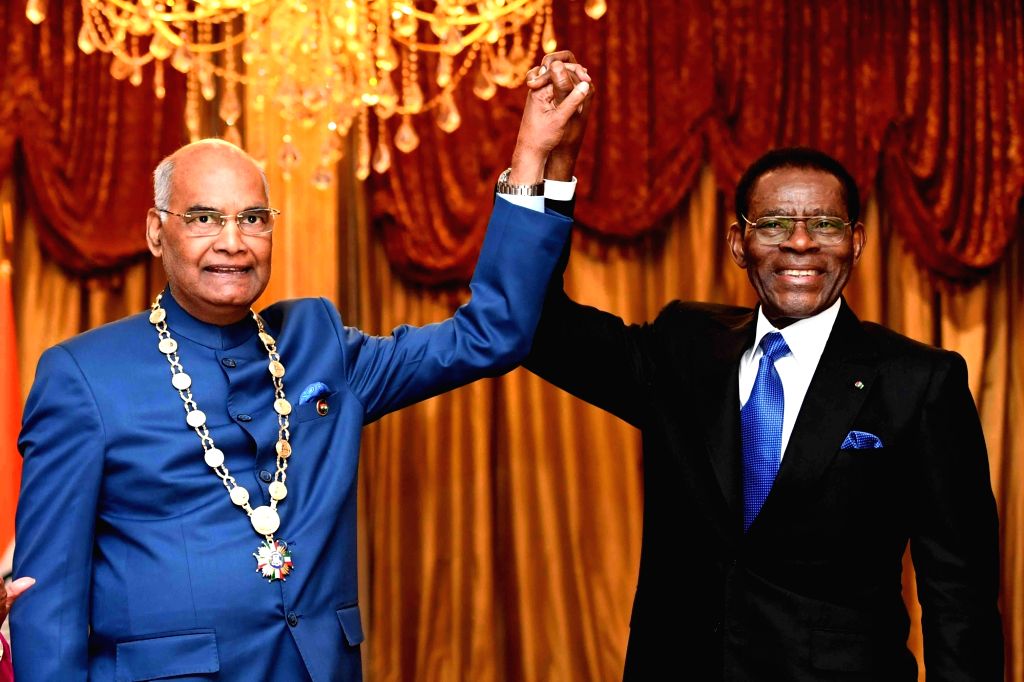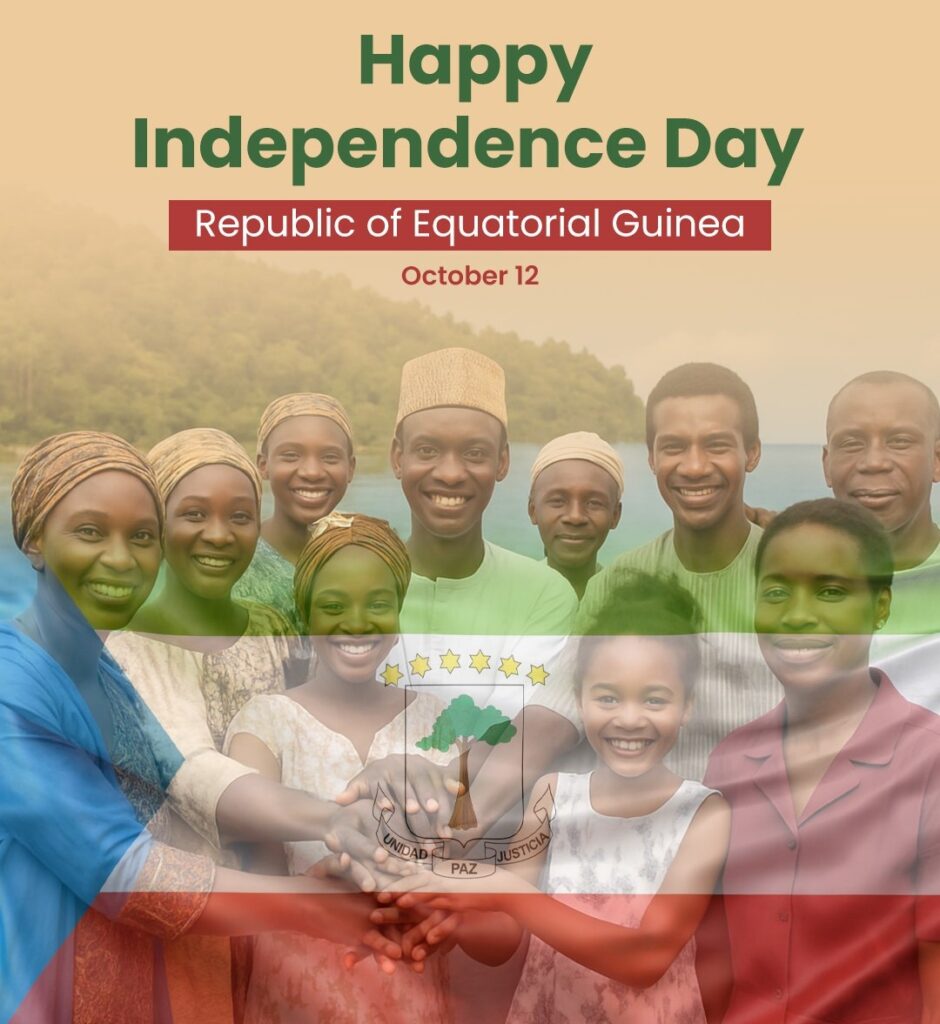On October 12, Equatorial Guinea commemorates its Independence Day — marking 56 years since the nation emerged from Spanish colonial rule in 1968.

As Equatorial Guinea marks its Independence Day today, it offers a timely moment to assess the trajectory of India’s engagement with this small yet strategically significant nation on Africa’s west coast. Often overlooked in the broader discourse on India–Africa relations, Equatorial Guinea exemplifies how New Delhi’s diplomacy extends beyond size or scale—anchored instead in shared aspirations for equitable growth, human capital development, and a genuinely multipolar Global South.
Diplomatic Beginnings and a Maturing Engagement
India’s engagement with Equatorial Guinea began in the early years of the new millennium, guided by the spirit of partnership that defined India’s Africa policy. The country was included under the TEAM-9 initiative — the Techno-Economic Approach for Africa–India Movement — which sought to promote cooperation with eight energy- and resource-rich nations in West and Central Africa.
Diplomatic ties gained institutional shape with the opening of India’s resident mission in Malabo in 2019, followed by the establishment of Equatorial Guinea’s embassy in New Delhi a few years earlier. These steps were more than symbolic; they represented a growing awareness on both sides that engagement between developing nations must extend beyond rhetoric to concrete institutional frameworks.
A landmark in this relationship was the 2018 visit of President Ram Nath Kovind to Malabo — the first-ever visit by an Indian head of state to Equatorial Guinea. During the visit, several Memoranda of Understanding were signed, covering cooperation in traditional medicine, medicinal plants, and information technology. India also announced support for establishing a vocational training centre and an English language laboratory in Equatorial Guinea — projects designed to enhance local skill-building and educational infrastructure.
Trade, Energy, and Emerging Opportunities
Historically, trade between the two countries has been driven by hydrocarbons, with India importing crude oil and gas from Equatorial Guinea. At its peak, bilateral trade touched nearly USD 760 million (2014–15). While trade volumes have since fluctuated with global energy cycles, the broader potential for economic diversification remains significant.
India’s strengths in pharmaceuticals, ICT, agriculture, renewable energy, and capacity building align well with Equatorial Guinea’s efforts to diversify its economy beyond hydrocarbons. Indian firms, including ONGC Videsh, have explored opportunities in the country’s oil and gas sector, while other areas such as health technology and agro-processing present fertile ground for future collaboration.
Health Diplomacy and Development Cooperation
In recent years, health and humanitarian assistance have emerged as important facets of India’s outreach. Earlier this year, during the first India–Equatorial Guinea Foreign Office Consultations (February 2025), India handed over a consignment of antiretroviral drugs and diagnostic kits to support Equatorial Guinea’s public health efforts. Such initiatives reaffirm India’s growing soft power — a model of partnership based not on aid dependency, but on human development and shared progress.
India has also continued to extend scholarships under the Indian Technical and Economic Cooperation (ITEC) programme, providing training opportunities in diverse fields from public administration to information technology. These capacity-building initiatives remain the bedrock of India’s development partnership with Africa, strengthening people-to-people bonds and enhancing institutional capacities.

Navigating Challenges, Nurturing Potential
Like most emerging partnerships, the India–Equatorial Guinea relationship faces its share of challenges. Connectivity and logistical constraints have limited the expansion of trade and tourism. Financial sustainability of earlier lines of credit has occasionally been difficult. Furthermore, the relationship still leans heavily on government-to-government mechanisms, with limited participation from the private sector, academia, and civil society.
Yet, there is reason for optimism. The institutionalization of Foreign Office Consultations, the growing visibility of resident missions, and a clear intent on both sides to diversify cooperation provide the necessary structure for growth. For India, the renewed focus on Africa — visible through the India–Africa Forum Summits and the Voice of Global South dialogue — positions it as a credible partner for countries like Equatorial Guinea seeking equitable collaboration.
A Young Partnership, Meaningful Footprints
It may still be early to speak of legacy in India–Equatorial Guinea relations, but there are already meaningful footprints. The establishment of embassies, the steady exchange of high-level visits, and the focus on skill development and health cooperation reflect a partnership grounded in substance rather than symbolism.
Equatorial Guinea, for its part, sees India not just as an economic partner but as a fellow developing nation that shares its aspirations for sustainable growth, technology-driven modernization, and a voice in global governance. Both countries are aligned on issues such as reform of the UN Security Council, climate justice, and the need for a more equitable global order — themes that resonate deeply across the Global South.
“The India–Equatorial Guinea partnership may not always make headlines, but it represents the essence of what India’s Africa policy stands for — solidarity, sustainability, and shared growth,” observes Rao Narender Yadav, Director of the African Centre of India. “It is in such quiet, consistent partnerships that the spirit of South–South cooperation finds its most authentic expression.”
The Way Forward: From Solidarity to Strategy
As the world undergoes rapid geopolitical and technological shifts, the India–Equatorial Guinea relationship must evolve from solidarity to strategy. Expanding cooperation in digital technology, climate action, education, and cultural exchange can make the partnership more contemporary and resilient. Joint projects in renewable energy, ocean economy, and sustainable agriculture could also create new synergies.
India’s experience in digital governance, fintech, and affordable healthcare holds particular promise for a young, aspiring Equatorial Guinea. Likewise, engaging the country’s youth through cultural diplomacy, scholarships, and entrepreneurship programmes can strengthen people-to-people connections.
As Equatorial Guinea marks another year of independence, the moment offers a reminder that small nations, too, can play outsized roles in shaping a fairer world. And as India deepens its Africa engagement — rooted in respect, mutual benefit, and shared destiny — its partnership with Equatorial Guinea stands as a quiet but powerful affirmation of that philosophy.